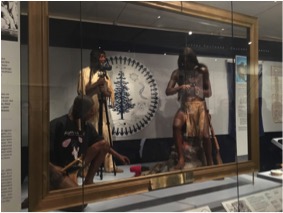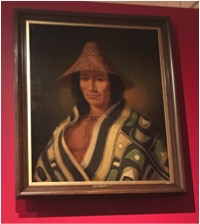This past January, the Faculty’s Issues with Indigenous Education class taught by Ixchel Bennett visited the Daphne Cockwell Gallery of Canada: First Peoples gallery at the Royal Ontario Museum, to experience the past and present history of Indigenous Peoples in Canada as presented by the ROM. The staff at the ROM shared their story of decolonizing and indigenizing their space by training their staff to analyze the historical role that museums have had and continue to have with Indigenous peoples. The ROM staff has made it a priority to work with and learn from the Indigenous people of Turtle Island in order to continue to bring the legacy of Canada’s First Peoples alive in their space.
 Within the Gallery, the York teacher candidates witnessed a portrayal of Indigenous people and culture represented in a variety of contexts including art pieces, artifacts and multimedia spaces. The exhibit, which was created in collaboration with the Native Learning Center of Toronto, was curated with the goal of encouraging visitors to critically think about how and why portrayals of Indigenous peoples and culture are shown in the “past” and not the “present”. One of the ROM’s main initiatives is to unpack the stereotypes and wrongful portrayal of Indigenous peoples through their exhibits in order to give visitors a true and accurate understanding of the culture and contributions of Canada’s First Peoples to Canadian society.
Within the Gallery, the York teacher candidates witnessed a portrayal of Indigenous people and culture represented in a variety of contexts including art pieces, artifacts and multimedia spaces. The exhibit, which was created in collaboration with the Native Learning Center of Toronto, was curated with the goal of encouraging visitors to critically think about how and why portrayals of Indigenous peoples and culture are shown in the “past” and not the “present”. One of the ROM’s main initiatives is to unpack the stereotypes and wrongful portrayal of Indigenous peoples through their exhibits in order to give visitors a true and accurate understanding of the culture and contributions of Canada’s First Peoples to Canadian society.
“My experience at the ROM left me immersed within the dialogue and in-depth discussion of Indigenous history,” said teacher candidate Nancy Rostom “I was inspired by how much effort the ROM invested into appropriately representing the history of Indigenous Peoples through this exhibit. It was incredible to realize the amount of information I actually did not know of Indigenous past and present history, and to also realize the amount of information that is omitted from our history books.”
“ As Teachers Candidates we learned that we have to be vigilant of what resources we use in the classroom when representing Indigenous Peoples and their culture,” said teacher candidate Zuleika Sattaur. “As future educators it is both our role and responsibility to not only unpack our own personal biases and prejudices, but to also provide a safe space for students to unpack their own biases and prejudices.”
As Teachers Candidates we learned that we have to be vigilant of what resources we use in the classroom when representing Indigenous Peoples and their culture,” said teacher candidate Zuleika Sattaur. “As future educators it is both our role and responsibility to not only unpack our own personal biases and prejudices, but to also provide a safe space for students to unpack their own biases and prejudices.”
As a part of their post-trip assignment, TCs were required to write a reflection of their experience at the ROM outlining how they can incorporate what they learned into their practicum placements and future teaching practice.
“The trip to the ROM was an opportunity for teacher candidates to experience first-hand how institutions are decolonizing their spaces by learning, unlearning and relearning Indigenous education,” said course director Ixchel Bennett. “TCs were not only challenged to examine their own personal biases and prejudices of Indigenous Peoples, but were also exposed to some of the ways that they could improve their knowledge and understanding of the past and present histories of Indigenous culture in order to be effective future educators.”
